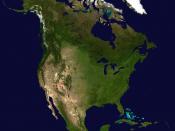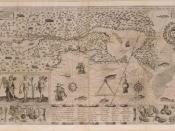The fishing in North America turned out as a very popular job for people, poor men could labor in the New World and get paid a fair amount of money having no knowledge of the techniques what so ever. As the countries joined into the fishing, the banks began to get less plentiful and less of a profit. Salt and preparation also had to be taken care of which meant more employment to cover and more people to pay; the profit slowly began to fall. After encounters with aboriginal groups, the men began to notice the rare furs that they wore and had possession of, the beaver was one of the furs greatly in demand due to endangerment. The merchants began to organize trades for the furs that were skillfully prepared and easy to work with, the cost of employment was lessened and the value of the items traded weren't as important.
Guns would be traded for 10 furs while beads were traded for 2.5. The Aboriginal people gladly traded for these items because they didn't have the knowledge to manufacture them and they helped greatly with hunt and culture. From then on, nations began to establish settlements to trade faster and more efficiently thereby draining the land of its resources.
The Europeans settled in North America surrounding the Great Lakes where the St. Lawrence connects to the ocean, a highway to Central America. In Canada, there were plentiful fresh and saltwater fish, excellent fur trades and precious minerals seen with less value to the aboriginal; it is said that when an explorer came to Canada with no food, he traded beads and other trinkets for food and gold. The Spanish settled in Central America where they found tropical foods and exotic birds, these were new to the world...


